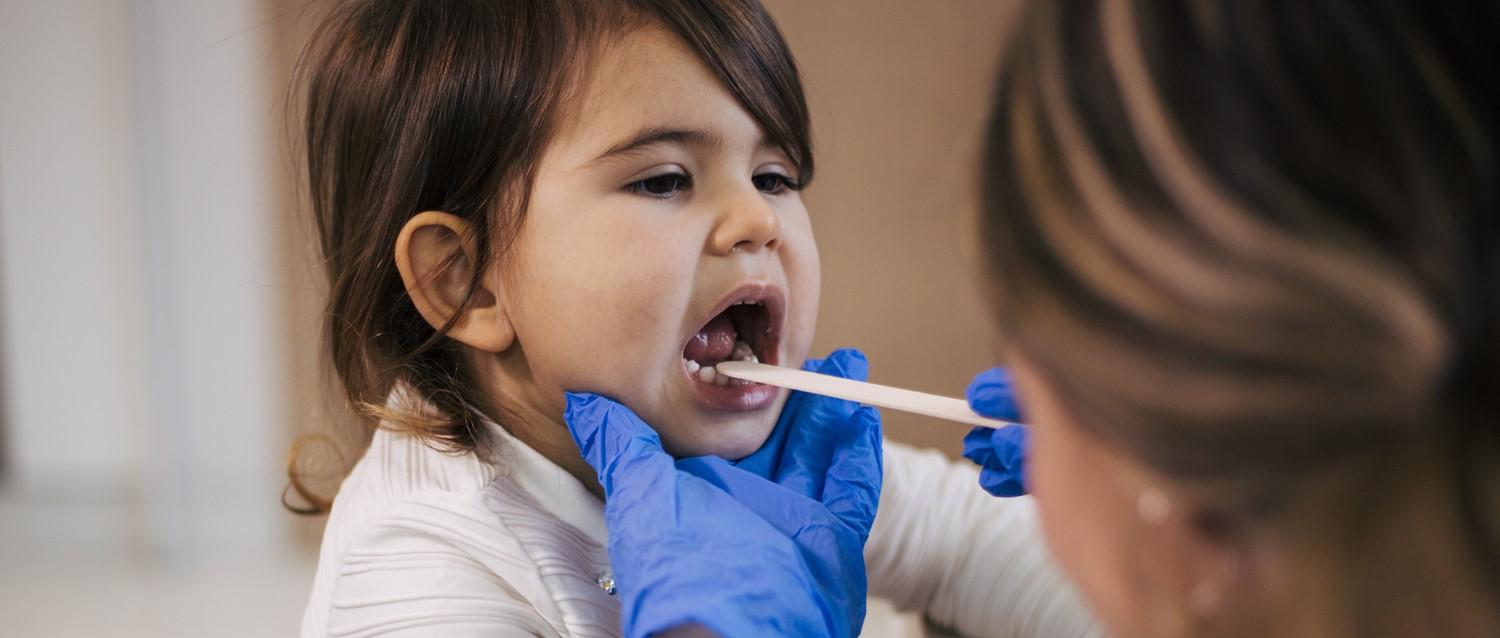
How to manage tonsillitis in children
Peer reviewed by Dr Krishna Vakharia, MRCGPAuthored by Lydia SmithOriginally published 28 Jan 2023
Meets Patient’s editorial guidelines
- DownloadDownload
- Share
- Language
- Discussion
Children pick up viruses all the time, particularly if they’re at nursery or playgroups where illnesses can spread easily. It can be hard to know whether a poorly child has a cold or something else such as tonsillitis - an inflammation of the tonsils. So what are the signs of tonsillitis, and how can you treat it in your child?
In this article:
Continue reading below
What is tonsillitis?
Tonsillitis is an inflammation of the tonsils and it's common in children, although adults and teenagers can get it too. It is normally caused by a virus, which spreads when we cough, sneeze, speak or are in physical contact with others. Sometimes, tonsillitis is caused by a bacterial infection.
What are the symptoms of tonsillitis in children?
Tonsillitis can feel like a bad cold or flu, but the tonsils at the back of the throat - the two round lumps - will be red and swollen. The main symptoms in children and adults are a sore throat, difficulty swallowing, a high temperature of 38C or higher, a cough, headaches, feeling sick, earache and feeling tired.
Sometimes, the symptoms can be more severe - such as swollen glands in your neck or blisters on the tonsils.
Continue reading below
How to treat a child with tonsillitis?
Tonsillitis usually gets better on its own after a few days, but there are things you can do to help manage the symptoms and keep your child more comfortable.
Make sure they get plenty of rest and sleep.
Ensure your child drinks plenty of water, which can soothe the throat and prevent dehydration.
Encourage your child to eat soft foods, such as soups, yoghurts or mashed potatoes and cooked vegetables, which can be easier to swallow if they have a sore throat.
You can give your child paracetamol-based medicines, such as Calpol, which can reduce a fever and ease pain. You can also give them children’s ibuprofen. It’s important to make sure you are giving your child the correct dosage for their age or weight.
Throat sprays may help ease sore throats, but they may not be suitable for younger children - speak to your local pharmacist about which ones that may be more suitable for your child.
When to speak to your doctor if your child has tonsillitis
If your child’s symptoms remain after four days or your child becomes more unwell, you should see your GP. You should also see your doctor if your child has pus-filled spots on their tonsils.
Complications caused by tonsillitis are very rare but include the development of an abcess called a quinsy - a fluid-filled blister in the throat - which can make it difficult to breathe. It's important to see your doctor or go to A&E if your child has difficulty breathing.
Most children get tonsillitis which is caused by a virus, but sometimes, it can be caused by bacteria. If this is the case, they may prescribe antibiotics. If your child is prescribed antibiotics, it's important that they finish the full course of the medication.
Patient picks for Throat and tonsils

Ear, nose and throat
What should you eat if you have tonsillitis?
You've got tonsillitis and your throat feels like sandpaper. You feel nauseous and it is difficult to swallow, which is making eating - and wanting to eat - challenging. When you're not feeling well, however, it's important to keep your strength up. So, if you're wondering what to eat with tonsillitis, we've got you covered.
by Victoria Raw

Ear, nose and throat
Coughs, colds and sore throats: is honey better than over-the-counter treatments?
As winter approaches, you might be tempted to fill your bathroom cabinet with pills and potions to treat the family’s coughs and colds. But according to a new study – as well as centuries of tradition and anecdotal evidence – you may be better off heading to the kitchen and reaching for a jar of honey.
by Allie Anderson
Continue reading below
Article history
The information on this page is peer reviewed by qualified clinicians.
28 Jan 2023 | Originally published
Authored by:
Lydia SmithPeer reviewed by
Dr Krishna Vakharia, MRCGP

Ask, share, connect.
Browse discussions, ask questions, and share experiences across hundreds of health topics.

Feeling unwell?
Assess your symptoms online for free
Sign up to the Patient newsletter
Your weekly dose of clear, trustworthy health advice - written to help you feel informed, confident and in control.
By subscribing you accept our Privacy Policy. You can unsubscribe at any time. We never sell your data.